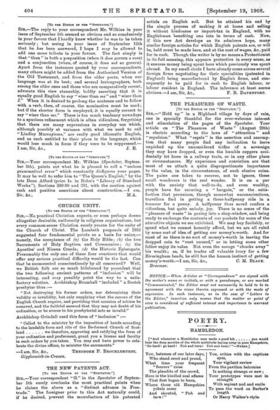THE NEW PATENTS ACT.
[To THE ED/TOR OP TEE " SPECTATOR"'] SIR,—Your correspondent "G." in the Spectator of Septem- ber 5th surely overlooks the most practical points when he claims the above as a " distinct advance in Free- trade." The foreigner prior to this Act naturally could, if he desired, prevent the manufacture of his patented
article on English soil. But he attained his end by the simple process of making it at home and selling it without hindrance or import-tax in England, with no Englishman benefiting one iota in terms of cash. Now, if this new Act develops as its admirers hope, many similar foreign articles for which English patents are, or will be, held must be made here, and at the cost of wages, &c., paid for in cash. Though the writer is by no means a Protectionist in its full meaning, this appears protective in every sense, as it ensures money being spent here which previously was spent abroad. In my small circle I have already come across several foreign firms negotiating for their specialities (patented in England) being manufactured by English firms, and con- sequently to be paid for in cash to English labour, or labour resident in England. The inference at least seems










































 Previous page
Previous page